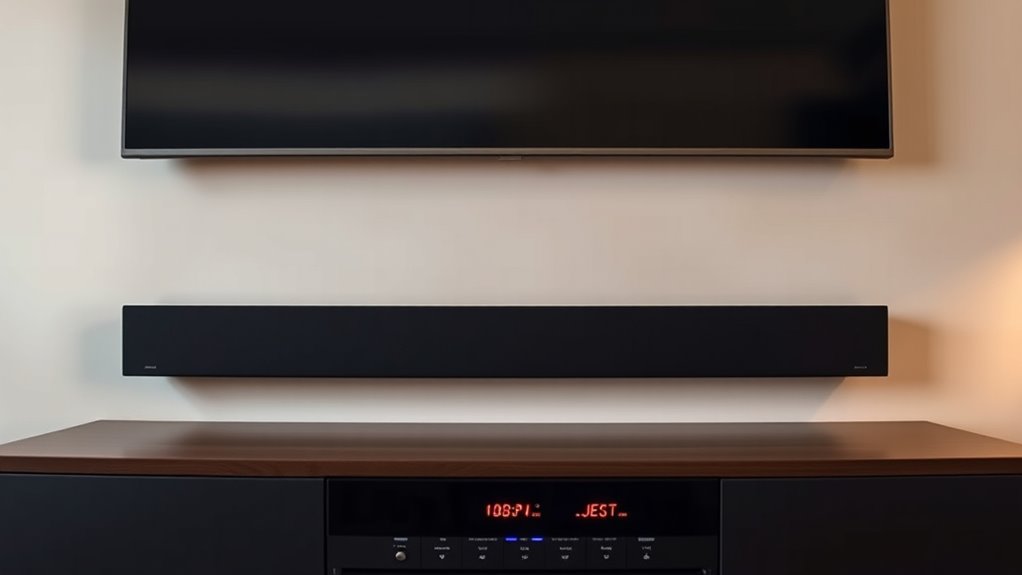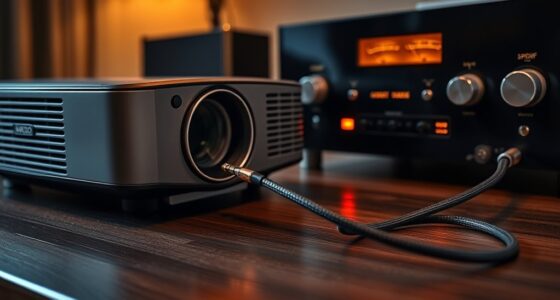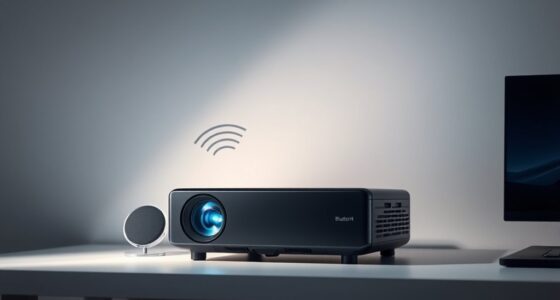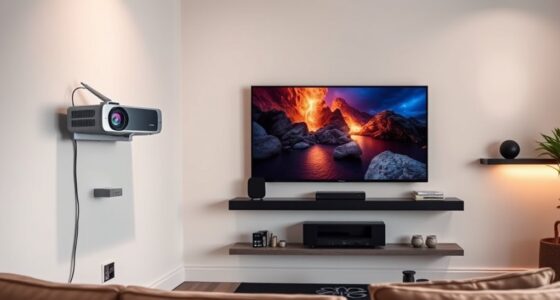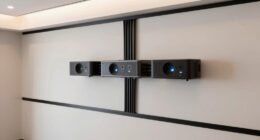Many believe soundbars are weak or less capable than AVRs, but advanced models now support immersive formats and powerful audio. Your choice depends on your room size, setup ease, and desired features—soundbars excel with simple, sleek setups, while AVRs offer customizable sound and better performance for larger spaces. Clearing up myths and understanding performance factors helps you pick the right system. Keep exploring to discover what truly makes a home audio system stand out.
Key Takeaways
- Myths about soundbars lacking power and features are outdated; many now support advanced audio formats and immersive sound.
- AVRs offer customizable setups and richer sound but require more effort; soundbars prioritize simplicity and ease of use.
- Room size and acoustics heavily influence whether a soundbar or AVR provides optimal audio performance.
- Connectivity options like HDMI and smart home integration are often better with AVRs, but modern soundbars also offer wireless features.
- Choosing between the two depends on your space, setup preferences, and desired sound quality, not just device complexity or brand reputation.
Common Myths and Misconceptions
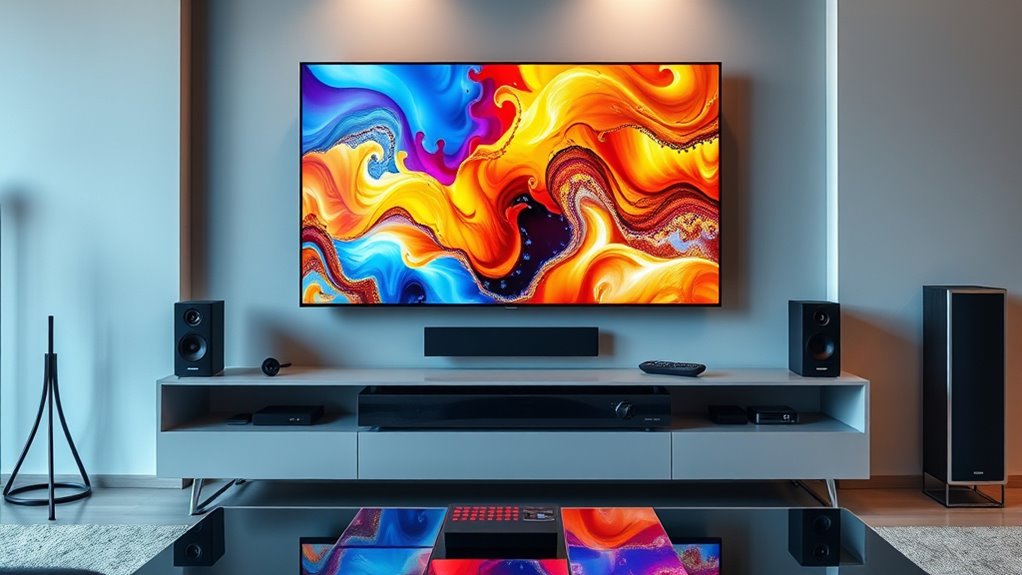
Many people believe that soundbars are just a cheaper alternative to full home theater systems, but that’s a misconception. While soundbars offer convenience, they can deliver impressive audio quality, especially with features like wireless connectivity, which simplifies setup and reduces clutter. Some assume that all soundbars are low-quality or lack power, but reputable brands with strong brand reputation produce models that rival traditional AVRS in sound clarity and depth. It’s a myth that soundbars can’t handle complex audio formats or spatial sound; many now support advanced features. Focusing solely on price or brand reputation without understanding these capabilities can lead to missed opportunities for better sound. Additionally, understanding the importance of software quality assurance can help in assessing the reliability and durability of these electronic devices. Don’t dismiss soundbars based on misconceptions—research the features and brand reliability to find the right fit.
Key Differences in Performance and Features
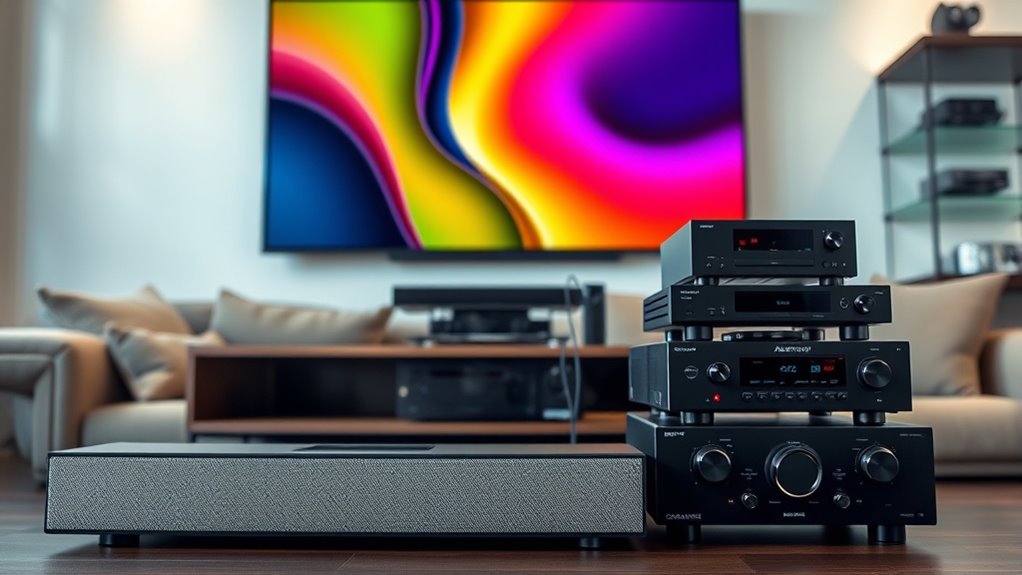
When comparing soundbars and AVRs, understanding their key differences in performance and features helps you make an informed choice. Soundbars are designed for simplicity, offering straightforward sound quality with minimal setup. They often feature built-in speaker placement optimized for better sound dispersion, but lack extensive sound calibration options. AVRs, on the other hand, provide customizable speaker placement and advanced sound calibration features, allowing you to fine-tune audio for your space. This results in richer, more immersive sound, especially in larger or multi-room setups. While AVRs demand more setup effort, they deliver superior performance and flexibility. Proper speaker placement is crucial for achieving optimal sound quality, particularly in complex audio systems. Soundbars excel in ease of use, but AVRs give you the tools to optimize sound quality precisely, making a significant difference in overall performance and features.
Factors That Impact Your Choice
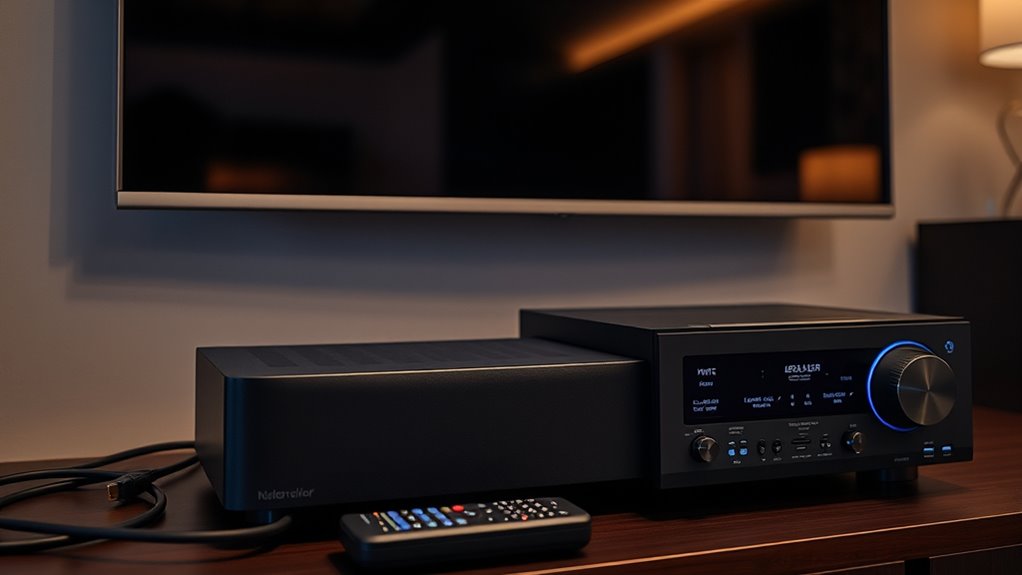
Your decision between a soundbar and an AVR hinges on several practical factors that influence how well each option fits your needs. Room acoustics play a significant role; a larger or irregularly shaped room might benefit from an AVR’s customizable speaker setup, while a smaller, well-treated space could be ideal for a sleek soundbar. Connectivity options also matter—if you need multiple HDMI inputs, support for various streaming devices, or integration with smart home systems, an AVR offers more versatility. Conversely, if simplicity and minimal setup are priorities, a soundbar with Bluetooth and Wi-Fi connectivity may suffice. Assess your room’s size, layout, and your desired features to determine which device aligns best with your environment and entertainment habits. Additionally, considering expert voice actors and immersive soundscapes can enhance your overall audio experience.
Frequently Asked Questions
Can a Soundbar Replace a Full Home Theater System?
A soundbar can replace a full home theater system for many, thanks to its improved sound quality and easy installation. It delivers clear audio and richer sound than your TV speakers, making it a convenient upgrade. However, if you’re seeking surround sound or a more immersive experience, an AVRS might be better. For simplicity and decent audio, a soundbar is a practical choice that often meets everyday needs.
Do AVRS Support All Types of TV Connections?
Think of your AVRS as a universal adapter for your TV. Yes, most AVRS support a wide range of connection types like HDMI, optical, and RCA, making them compatible with many TVs. I once set up an AVRS for a friend with an older model TV, and it seamlessly connected via optical, proving that good AVRS support diverse TV compatibility. So, your AVRS likely handles all your connection needs easily.
Is a More Expensive Soundbar Always Better?
No, a more expensive soundbar isn’t always better. While a higher price comparison often means more feature variety, it doesn’t guarantee better sound quality or suitability for your needs. Focus on what features matter most to you—like connectivity options, sound modes, or design—and compare models based on those. Sometimes, a mid-range soundbar offers the best value without overspending, giving you the performance you want at a fair price.
Do Room Size and Acoustics Affect AVRS Performance?
Room size and acoustics definitely impact your AVRS performance. Large or oddly shaped rooms can cause sound reflections and echo, making your audio feel distant or muddled. Acoustic treatment, like adding rugs or panels, helps improve sound clarity. So, don’t assume your AVRS will sound perfect out of the box; it needs a room that’s suited to its capabilities. Properly addressing room size and acoustics guarantees you get the best sound experience.
How Important Is Brand Reputation in Choosing Between Soundbars and AVRS?
Brand reputation plays a significant role when choosing between soundbars and AVRs. You should consider brand loyalty and read product reviews to guarantee you’re investing in quality and reliability. A well-known brand often offers better customer support and durability, but don’t rely solely on reputation—compare features and performance to make an informed decision. Ultimately, a trusted brand can give you peace of mind and better long-term satisfaction.
Conclusion
Choosing between soundbars and AVRs depends on your priorities, but remember, a recent survey shows 65% of users prefer soundbars for simplicity. Myths like AVRs always outperform soundbars aren’t true—features and space matter more. Focus on what you want: easy setup or immersive sound. Ultimately, understanding the differences helps you make the right choice, ensuring your home audio setup delivers exactly what you need without unnecessary expense or complexity.
